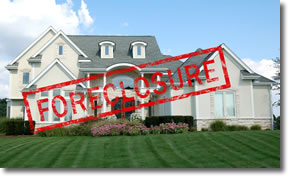Buying Foreclosures
How Banks Sell Foreclosure Homes
There are more millionaires made in real estate than any other business vertical. One of the most common ways that real estate investors spend their money is in the purchasing of Foreclosure properties.
Although there are technically a slight difference between Foreclosures and REO’s — we will be using the two words as interchangeable.
Foreclosures or REO properties are bank owned real estate that has been taken back from the previous owner due to lack of payment of the note.
Foreclosed homes can be a good value – but not always. Navigating the foreclosures market can be treacherous.
 Banks generally don’t like to leave too much money on the table. One of the first things that a bank (that owns a foreclosed property) will do is have the property appraised. They will look at the property from a variety of angles.
Banks generally don’t like to leave too much money on the table. One of the first things that a bank (that owns a foreclosed property) will do is have the property appraised. They will look at the property from a variety of angles.
- How much can they get for the REO in its current condition?
- How much would it cost to bring the property up to other similar homes in the neighborhood?
- How much money (and how quickly) are the homes selling for in the area.
The bank will generally hire a real estate agent/broker to handle the sale of the foreclosed property. That person will complete a BPO on the property — which will contain much of the information that is on an appraisal – plus the above information.
Once the bank has a firm understanding of the local real estate market and how much they can get for the house (in its current and improved states), they will list the property.
They may, at their option, choose to do some or all of the repairs. Although banks generally do not like to fully repair homes, in many instances, they will make some upgrades to where the property can be sold with an FHA or VA mortgage.
Buying a Foreclosed Home
This is not meant to be a full guide to purchasing a foreclosed home, but will set the stage for what you are in for.
Buying an REO home will require a ton more more paperwork that a traditional home purchase. Banks will generally require their addendums to the contract, which in many instances, re-writes the entire purchase agreement in their favor. These are NOT optional when buying a foreclosed home. You will want to use a good Realtor, who has experience with REO properties to review your amendments and addendums provided by the bank,
Expect It To Go Slow
When you purchase a home from an individual, you can expect to close on that property, usually within 30-45 days. On the other hand, when buying a foreclosed home, that time period will most likely be much longer. Banks are not quick to respond. In addition, in many instances, banks may not even have all of the finalized title transfer when they list the home. That time works in the benefit of the bank that owns the property – as their unique addendums usually give them an “out” — so if they get a substantially higher offer, they may take it.
Conclusion
Buying a foreclosed property can be a great investment. But keep in mind, just because the home is an REO does not mean that its a great deal. Banks do not like to leave money on the table. Also, you will want to have someone on your side that understands the process (because its different) and is familiar with the paperwork.
If after hearing all of that, you are still ready to make your first real estate investment in a foreclosed property – we wish you the best!




